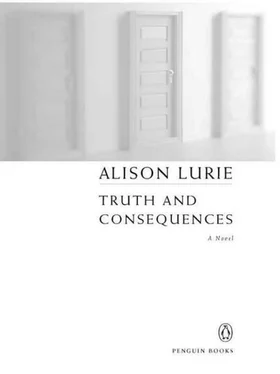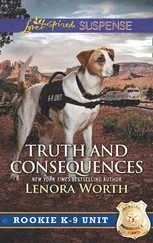“Nobody will believe that, not if Jane tells them what she saw. There’ll be a scandal.”
“So what?” She shrugged.
“You don’t care?”
“Why should I? It’s right what they say: in the long run, all publicity is good publicity. Scandal is what everyone wants and expects from us: melodrama and farce and comedy and tragedy. Writers and artists who lead conventional, blameless lives, they don’t last. Everyone’s bored by them.” Delia gave a little catlike yawn. “You know, they’re rather pretty, Wally Hersh’s lilies,” she remarked. “Pity to let them die.” She began to gather the flowers that lay on the sofa. “They stand for purity and innocence, you know.”
“Really.” Thinking how inappropriate they were in this case, Alan handed her two long-stemmed lilies that had fallen near him. Close up, they seemed to be made of thick white suede.
“Thank you.” She smiled.
“Here’s some more.” With another twinge of pain, he collected two saucer-sized golden chrysanthemums, but Delia pushed them away.
“No, leave those. Yellow mums mean slighted love.”
“You don’t believe that.”
“Of course I do.” She sighed. “Nobody understands the Language of Flowers anymore. And they don’t understand that it has power, even if you don’t know it.”
“Yeah, it looks like you’re already slighting Wally Hersh’s love,” he said, dropping the mums in the wastebasket.
“No; not completely.” Delia giggled and stooped to gather more lilies and pose with them. In spite of what had recently happened, she seemed quite calm, and fully absorbed in this task.
“Well,” Alan said, after watching for a few moments, baffled. “It doesn’t look like Jane’s going to give me a ride home. I’d better go call a taxi. Do you want a lift?”
“No thanks. Henry will pick me up.”
“I don’t suppose you’re going to tell him what happened.”
For the first time since Jane had left, Delia looked at Alan directly. “Are you mad?” she asked. “Anyhow it’s none of his business, what you and I do, what we have together.” She smiled warmly, almost seductively. “It’s on another plane entirely. Come on, don’t look so sad.” She moved nearer and gave him a quick, wet kiss. “Everything’s going to be all right. Only if I were you I wouldn’t go home just yet.”
At two a.m. that night, Alan lay awake and in pain in a confusion of blankets and sheets and a sense of having behaved both stupidly and badly. Whether he opened his eyes or shut them, he kept seeing Jane’s face white against the darkness, with its expression of shock, hurt, and anger.
Following Delia’s advice, he had delayed his return and gone to the faculty club for supper. In his confused state of mind, he had forgotten that sitting in a straight chair for more than a few minutes at a time always aroused the lizard in his back—whom he now sometimes thought of as Old Clootie, the familiar name of the Devil among his Scottish ancestors. At home and in the office he usually stood up or lay down on the sofa to eat.
Last night, even before his food came, he had to stand up and walk about, causing the waiter and the other diners to look at him oddly. Fortunately, no one he knew was in the faculty club, but even so, agony and embarrassment had made it impossible for him to finish the meal, though he managed to drink a Scotch on the rocks and half a bottle of wine. Afterward he stumbled dizzily and painfully out into the lobby and called a taxi. As he did so, inside his spine, Old Clootie flexed his claws and smiled.
For the first few minutes of the ride Alan tried to sit up like a normal person, but was unable to manage it. When Jane drove him to campus he always lay down in the back seat, to minimize the pain.
“Hey, you all right back there?” the taxi driver had inquired.
“Fine, just a little tired,” Alan had replied in blurred tones that, he realized, sounded like those of a drunk.
He had arrived home in agony, but still resolved to deny everything. When Jane asked, in a voice that combined fear and rage, where the hell he had been, he had said, as planned, that he had wanted to give her time to cool off.
“Listen, my back is in spasm,” he had told her. “I have to take a pill.”
“I’m sorry,” Jane said almost automatically, in a flat, neutral voice. She followed him into the kitchen and stood waiting while he gulped water and painkillers. “I’m very sorry it hurts, but I need an explanation.”
“Maybe it’s you who owe me an explanation,” Alan said, his words blurred by pain and alcohol. Then, though it felt unreal, he took the offensive and rebuked her for her rude unprofessional behavior and leap to false conclusions. He insisted that his presence in Delia’s office had been an act of concern and friendship—telling himself meanwhile that if he was stretching the truth, it was also out of concern and friendship. He was sparing Jane information that would hurt her unnecessarily.
As he spoke in imitation of a firm, reasonable manner, he felt a rush of pity and affection for his wife: this small brown-haired woman with her neat shirtwaist dress, her fading prettiness and wide blue eyes, reddened as if with weeping. She was a good person who loved him and had been unfailingly kind to him over the long months of his pain. It wasn’t her fault that her kindness had begun to feel more and more like a burden.
“I don’t believe you,” Jane said when he finished, her voice trembling. She sagged against the electric stove as if for warmth and support. “I think you’re just saying what Delia told you to say.”
“That’s ridiculous,” Alan replied weakly, alarmed by her guess. “You’re really prejudiced against her,” he added, regaining control. “You have been from the start.”
“No, that’s not so—” Jane’s voice wobbled.
“You’ve always been determined to think the worst of her.”
“I haven’t, I’ve tried—”
“That first week, you told me she was a complete egotist.”
“Well, she is. She never thinks of anyone except herself.”
“That’s just not true,” Alan said. “Delia’s actually a very wonderful and generous person.”
Jane turned to stare at him. “You’re in love with her too,” she stated in the tone of someone who has just turned over a rock and found a dead toad under it. “Just like everyone else.”
“I—” Alan opened his mouth to deny this, but was unable to do so. “Don’t be stupid,” he said. “She’s been a very good friend to me. To us,” he amended. “She’s found me a gallery that’s already sold over fifteen thousand dollars’ worth of my work. She’s why we have that pasta-making machine you’ve wanted for so long.”
“I don’t care. I hate her, if you want to know the truth,” Jane had cried, “and I hate that pasta machine. It’s more trouble than it’s worth. I can’t tell the least difference between what it makes and normal pasta, and I don’t believe anyone else can either.”
In spite of himself, Alan (who believed he could tell the difference) must have allowed an ambiguous smile to appear on his face at this. Jane may have taken it as a smile of epicurean superiority, for a sudden spasm of rage convulsed her small neat features, and she snatched up the pasta machine and threw it, not exactly at Alan but at the floor next to his right foot, where it landed with a noisy, unpleasant jangle and thud.
“Jesus Christ,” he exclaimed, jerking aside in a way that wrenched his back. “For shit’s sake, Jane, get ahold of yourself.” But already she had turned away from him and was hanging on to the back of a kitchen chair, weeping violently.
“I’m sorry—I shouldn’t have—” She stooped to retrieve the broken pasta machine. “But it’s because you’re lying to me, lying and lying,” she sobbed. “If you would just tell the truth, it wouldn’t be so awful.”
Читать дальше







![Кэмерон Доки - Правда и ее последствия[Truth and Consequences]](/books/79610/kemeron-doki-pravda-i-ee-posledstviya-truth-and-con-thumb.webp)




